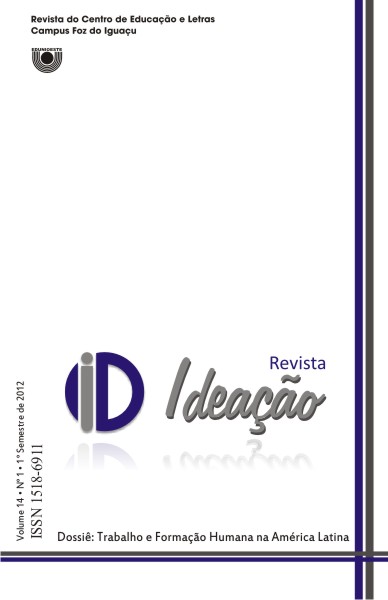EXPERIÊNCIAS COMPARADAS NA EDUCAÇÃO DO CAMPO ENTRE BRASIL E CUBA E AS POSSIBILIDADES DE FORMAÇÃO OMNILATERAL NA AMÉRICA LATINA
DOI:
https://doi.org/10.48075/ri.v14i1.6053Palavras-chave:
Práticas Educativas, Educação do Campo, Formação Omnilateral, América Latina, Justiça GlobalResumo
Este texto tem por objetivo apresentar os desafios e aspossibilidades da formação omnilateral na América Latina conforme
elaborado em Villela (2009-2010). Este trabalho tem por horizonte
sistematizar as práticas educativas do “Terceiro Mundo”, isto é, originadas
da experiência educacional dos países da América Latina, África e Ásia.
No processo de luta pela emancipação, esses países construíram e estão
construindo práticas educativas originais. Nesse sentido, partimos da
problematização histórico-teórico do tema, formação omnilateral, e por
desdobramento, abordamos a América Latina, escola e formação
omnilateral. Problematizamos especificamente as questões relativas
aos intelectuais e a organização trabalho pedagógico nas “escolas no
campo” em Cuba (1960-1975). A questão dos “intelectuais e a organização
da cultura”, sob uma perspectiva gramsciana (Gramsci, 2000), foi
abordada em diversos trabalhos ao longo de nossa trajetória acadêmica
(Villela, 2003; 2008; 2009-2010). No sentido de aprofundar tais
questões, abordamos os desafios da formação de crianças e jovens do
campo na América Latina. Ao analisarmos as práticas educativas em
educação do campo, emerge a temática contemporânea da justiça global.
Downloads
Publicado
Como Citar
Edição
Seção
Licença
Política para Periódicos de Acesso Livre
Autores que publicam nesta revista concordam com os seguintes termos:
1. Autores mantém os direitos autorais e concedem à revista o direito de primeira publicação, com o trabalho simultaneamente licenciado sob a Licença Creative Commons Attribution que permite o compartilhamento do trabalho com reconhecimento da autoria e publicação inicial nesta revista.
2. Autores têm autorização para assumir contratos adicionais separadamente, para distribuição não-exclusiva da versão do trabalho publicada nesta revista (ex.: publicar em repositório institucional ou como capítulo de livro), com reconhecimento de autoria e publicação inicial nesta revista.
3. Autores têm permissão e são estimulados a publicar e distribuir seu trabalho online (ex.: em repositórios institucionais ou na sua página pessoal) a qualquer ponto antes ou durante o processo editorial, já que isso pode gerar alterações produtivas, bem como aumentar o impacto e a citação do trabalho publicado (Veja O Efeito do Acesso Livre).
Licença Creative Commons
Esta obra está licenciada com uma Licença Creative Commons Atribuição-NãoComercial-CompartilhaIgual 4.0 Internacional, o que permite compartilhar, copiar, distribuir, exibir, reproduzir, a totalidade ou partes desde que não tenha objetivo comercial e sejam citados os autores e a fonte.


